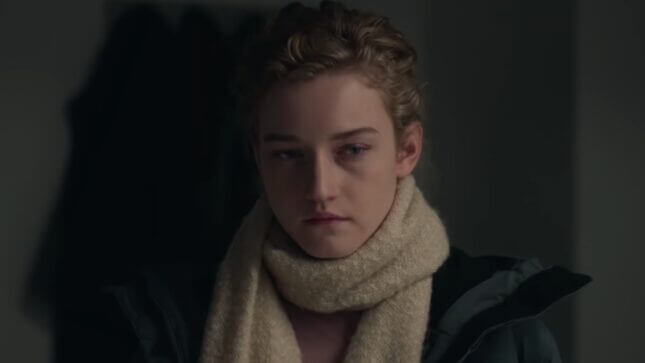

When it comes down to it, The Assistant is a movie about silence. Directed by Kitty Green, the film follows Jane (Julia Garner) from the beginning to the end of one difficult workday as the assistant to an abusive film executive. It’s hard to say if it’s a particularly difficult day, though, because part of what the film tries to convey is that all of Jane’s days are like this: a series of humdrum indignities that Jane struggles to push aside or endure. Resistance is futile. There is no escape.
Unfortunately, it’s that very idea that makes The Assistant feel toothless. It’s no secret that the film is based on the abuse that disgraced producer Harvey Weinstein inflicted on his staff as the head of the now-defunct Weinstein Company—it’s been actively billed as the first film to tackle the scandal. But for those outside media or film who may not have followed the many tendrils of Weinstein’s various abuses, The Assistant feels like a strange rendering of a broken system that should simply be left to continue on unchanged.
Spoilers ahead.
The Assistant feels like a strange rendering of a broken system that should simply be left to continue on unchanged.
One of the very first things Jane does after she is introduced is clean what is heavily implied to be her boss’ semen off of his office couch. It’s a lingering suspicion that’s all but confirmed when later in the film, the company’s production and distribution executives enter the office and joke that no one should ever sit on it. It’s one of many ways in which the film shows how casually the office culture has been poisoned from the top down.
Jane consistently faces the casual misogyny of working in a male-dominated environment and moves through it by keeping her head down and getting to work. She is mostly relegated to housekeeping tasks like putting out refreshments for meetings and keeping the office kitchen clean. But she’s also in charge of managing her boss’ travel arrangements and is repeatedly forced to deal with his irate wife, who keeps calling the office, suspicious of her husband’s behavior and demanding to know his whereabouts.
But during this day, a series of events spur Jane into action. Sienna (Kristine Frøseth) joins the staff as her boss’ fourth assistant. She has no experience but wants to work in film. Their boss puts Sienna up in a nearby hotel and later cancels a meeting to spend the afternoon there. The implication is clear—Jane fears that her boss will assault or otherwise harm Sienna. So she makes her way down the street to visit the company’s HR director Wilcocks (Matthew MacFadyen). As one might expect, Wilcocks is no help at all and heavily implies that her “jealousy” will cost her her job. When Jane agrees not to file the report and gets up to leave, he tells her that she needn’t worry, because she’s not her boss’s type.
Green’s direction is strongest in the many moments like this. Her use of static shots filled with internal movement brings a rightful claustrophobia to the film. Jane stands still as this broken system continues on around her. Conversely, the system remains, while her conscience rumbles within. Garner has few lines but telegraphs everything needed with her face, her forcefully serene expression refusing to give away the sheer exhaustion of enduring the emotional toll of these repeated indignities. Tight close-ups reveal what Jane will not say. The situation has become untenable.We never do meet Jane’s boss. The faceless Harvey stand-in remains an intimidating specter on the other end of the phone—a faceless menace whose presence is hard to shake. He calls to abuse her and cajole her, prompting banal emails of apology—a mere formality that has become routine for her and her colleagues when they run afoul of his temper. But the most upsetting parts of the film aren’t the abuses Jane’s boss doles out. Instead, it’s the resignation from everyone that rankles. Colleagues tell her that the women who trek in and out of their boss’ office will “get more from this than he will” and scoff at the idea that they should be concerned. The normal operating procedure of this enterprise is the manipulation and dismissal of women, and it has gone on for so long that it has ceased to register as a problem in the first place.
It’s why the film’s ending feels so frustrating. True to life as it may be, it robs the story of all bite. Jane tries and fails to right things, and then… gives up. She continues on with her evening, witnesses the very abuse she so feared would happen through a curtained window, and makes her way home. It’s clear over the course of the story that Jane is desperately looking to find a way to avoid resigning herself to complicity without making herself and her career a casualty. But she never does discover how. There is no indication that she has been changed in any way by the day’s proceedings. She doesn’t quit, she doesn’t cry—we see no outward indication of frustration. In fact, the overwhelming impression is that instead, she accepts her boss’ behavior as inevitable, letting the company’s culture swallow her whole in order to save herself. The film’s silence resonates once again.
The Assistant is currently in theaters.